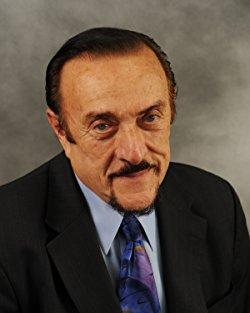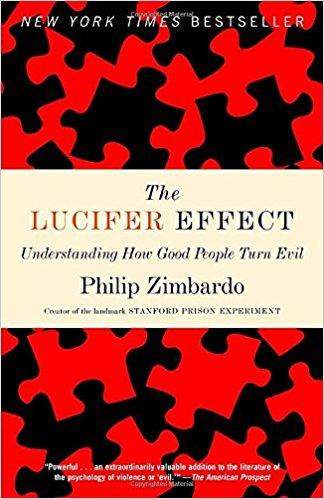The Lucifer Effect Summary
5 min read ⌚
 Understanding How Good People Turn Evil
Understanding How Good People Turn Evil
How many times have you asked yourself “why are people so evil?”
Well, we have the answer!
It turns out that our nature is not the one that decides on which side of the good/evil line we fall, but the circumstances that surround us.
Now, let’s expand this conclusion more in detail.
Who Should Read “The Lucifer Effect”? and Why?
Can you guess the meaning of the title?
Lucifer was an angel who challenged God’s authority and was sent to hell along with other fallen angels. There he becomes Satan, the personification of all evil.
You can already guess what “The Lucifer Effect” is about. Good can indeed go bad.
But how does this happen? What are the preconditions for turning evil?
We recommend this book to all readers who want to get a better understanding of human nature, as well as to those who wish to know why good people can turn evil.
About Philip Zimbardo
 Philip Zimbardo, famous for his Stanford prison experiment, used to teach psychology at Stanford University. He is also an author and a former president of the American Psychological Association.
Philip Zimbardo, famous for his Stanford prison experiment, used to teach psychology at Stanford University. He is also an author and a former president of the American Psychological Association.
“The Lucifer Effect Summary”
Try to think of a time when you took something that was not yours, while no one was watching.
Most people have a memory of something like that.
No, it is not the greatest of evils, but it shows that sometimes we are willing to do things which we would not do if the situation did not allow it.
However, in our conception of the world, we adopt the notion that some people are born evil, and that is it.
The truth is somewhat different. In reality, the line between good and evil is fragile, and people can pass it.
So pointing fingers and the assumptions that only evil people do evil deeds are wrong.
So, what makes good people do bad things?
Psychologists and psychiatrists focus on dispositional causes, or the inborn traits of our behavior such as character, genetic, pathologies.
However, although we do carry these attributes with us, there are some situational causes which are more responsible for our behavior than our inherent characteristics.
Just think of the way you behave around your friends and the way you act around small children. You can see a different image of yourself, can’t you?
What we want to say is that personalities and human character are not static. They do change, according to the circumstances and the social contexts that surround you.
This perception is called the situational approach to comprehending human conduct. What it means is that you become what you need to become based on the situation you are in.
Okay, it is clear that some circumstances can turn ordinary people into monsters. But what are the specific factors?
One vital aspect of the transformation of individuals is obedience to authority. It does not matter what “authority” is – it can be a human, a set of rules, or an institution.
What is important is that most people choose to be obedient even if it means to be cruel.
Authority figures, as history shows, can turn from good to evil as well. Followers rarely disobey. They also follow the change.
Another thing that can cause evil deeds to happen is a lack of personal responsibility.
In these cases we talk about deindividuation which leads to carrying out evil actions, when you believe are anonymous. Studies show that people are more tempted to be evil when they think that no one will recognize them.
Disguising one’s appearance and acting in places where the chances of being recognized are low are two ways to inspire deindividuation.
Most people around the globe believe they are morally upright. But history is full of examples of cruelty to humans, from fellow humans.
How can we justify this?
By dehumanization, or the process of stopping to see someone as fully human. Understanding this concept is critical in comprehending discrimination, prejudice, and racism.
When others are seen as inhuman, they automatically become unworthy of moral considerations and thus are targets of cruelty.
Another enabler of evil is the ability to cover evil deeds with words that make them sound justifiable and even reasonable. In other words, a cover story can justify immoral action.
The term cover story is used in social psychology, while in real life situations, we know this concept under the term “ideology.”
With the right ideological frame, evil deeds can be masked not only as good but as honorable as well.
We mentioned a lot of evil enablers. And indeed, there are many.
Right now you might be wondering about the complete opposite. If evil can happen in so many ways and because of so many things, then what does it take to be a good person?
You will find some of the answers in the key lessons below.
Key Lessons from “The Lucifer Effect”
1. Do Not Avoid Responsibility
2. Stop Obeying Unjust Authority
3. What Makes a Hero?
Do Not Avoid Responsibility
Always consider yourself responsible for your choices, and stop any excuses that may arise in your mind. If no one can see you, it does not mean that what you are doing is not happening.
Stop Obeying Unjust Authority
Start thinking for yourself, and if you ever feel that authority is unjust, stop following and obeying it. Always questions the ideologies that people present to you that justify evil acts.
What Makes a Hero?
It is one thing to avoid evil, and it is entirely another thing to do something about it.
Two main characteristics define heroes.
First, heroes do something while everyone else is passive. And second, they are altruistic and put others before themselves.
We all have the potential to become a hero or a monster. The choice is yours.
Like this summary? We’d Like to invite you to download our free 12 min app, for more amazing summaries and audiobooks.
“The Lucifer Effect” Quotes
If you put good apples into a bad situation, you’ll get bad apples. Share on X Sticks and stones can break your bones, but names can kill you. Share on X The line between good and evil is permeable and almost anyone can be induced to cross it when pressured by situational forces. Share on X Heroes are those who can somehow resist the power of the situation and act out of noble motives, or behave in ways that do not demean others when they easily can. Share on X The level of shyness has gone up dramatically in the last decade. I think shyness is an index of social pathology rather than a pathology of the individual. Share on XOur Critical Review
Zimbardo connects the dots from being an angel to becoming evil. His writing is detailed and comprehensive and is a wonderful read for all readers interested in psychology.
Emir is the Head of Marketing at 12min. In his spare time, he loves to meditate and play soccer.


 Understanding How Good People Turn Evil
Understanding How Good People Turn Evil




